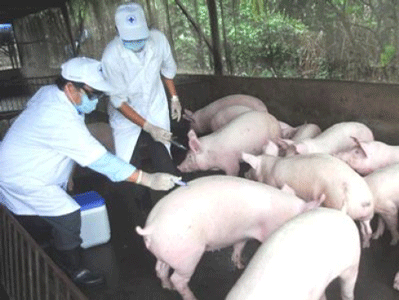Porcine Reproductive & Respiratory Syndrome, also known as ‘blue ear disease’, is on an upward trend; as a result, more and more people are contracting a bacterium virus called ‘Streptococcus Suis’ from pigs in North Vietnam.

The Central Tropical Disease Hospital has admitted more than 20 people infected with the above bacterium, said Dr Nguyen Hong Ha, head of the hospital on June 19.
Patients were rushed to the hospital in critical condition and they were suffering from serious complications such as meningitis and septicemia.
Most patients contracted the ‘Streptococcus Suis’ bacterium after eating undercooked infected pork, blood paste, or came into direct contact with secretion from diseased pigs via open wounds or airborne tracts. Dr. Ha warned people not to slaughter and eat diseased pigs.
Meantime, Dr. Le Xuan Hung, deputy president of the Institute of Malariology, Parasitology and Entomology, said the Institute receives tens of people every month who have contracted the bacterium; and at time the numbers of such patients could account for about 80 percent of patients at the Institute. Many of them are hospitalized in a state of near limb paralysis or with convulsion fits.
Most patients come from poor households living in unhygienic and squalid conditions, said Hung, and with very little or no awareness of how the disease is transmitted.
The blue ear disease has been detected in the northern provinces of Lang Son, Dien Bien, Bac Ninh, Quang Ninh, Lai Chau and Hoa Binh.
In related news, the Department of Preventive Medicine under the Ministry of Health organized a meeting under the theme “To increase prevention of uninfected disease by preventive medicine”.
The rate of uninfected diseases has reached an alarming rate in the country. According to the latest statistics, uninfected diseases make up 71 percent of diseases in the country.
Apart from this, the rate of affected people and deaths are also increasing dramatically more than from infected diseases, malnutrition and mother-child ailments.
Uninfected diseases are diabetes, heart ailments, cancer and chronic lung problems that have caused great negative impact on economic, social and politic life as they cause an increase in medical spending and reduce labor capacity.
According to medical experts, uninfected diseases surge because of globalization, urbanization, economic and social factors as well as smoking habits, unbalanced nutrition, lack of exercise and alcohol addiction.
























